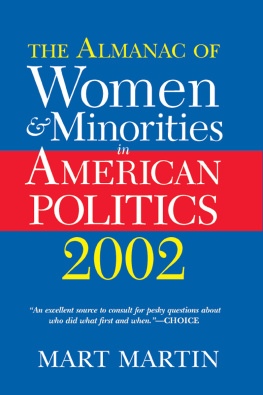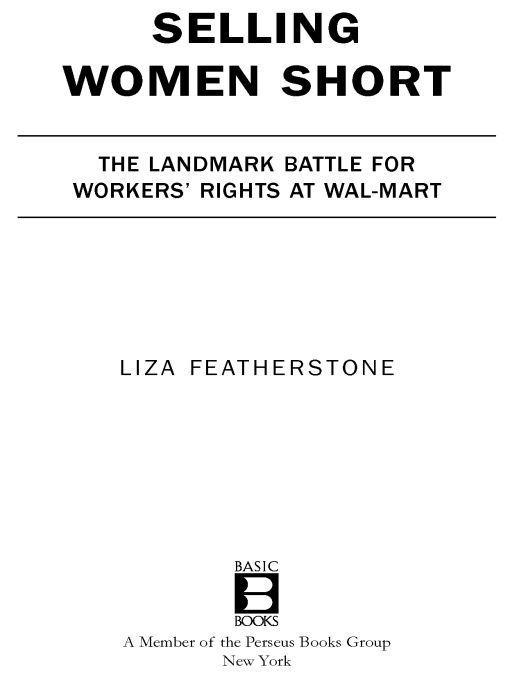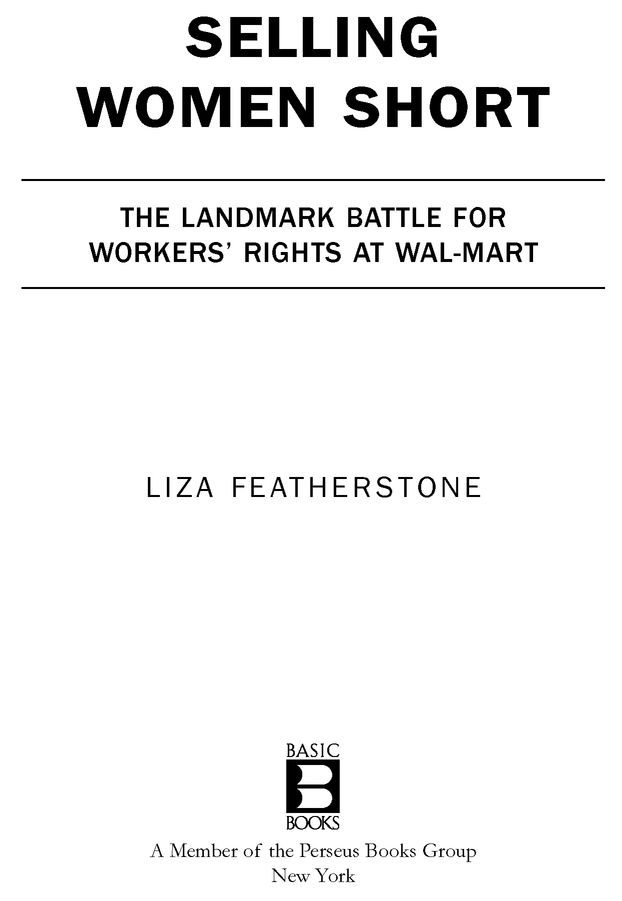Table of Contents
Praise forSelling Women Short
Featherstones book is a valuable document of a case that will be written about in the national media only if something happens with it, when Wal-Mart is happening all the time.
Newsday
Featherstone walks us through the pending sex-discrimination class action against the worlds largest employer (the suit covers 1.6 million women), recounted experiences of female workers that belie the discount retailers image as a family-friendly company where hard work and sacrifice will be rewarded. Could the class action change policies regarding pay and promotion? Featherstone... is optimistic.
Newsweek
For your insensitive brother-in-law... that should change his way of thinking.
Village Voice
This book breathes life into the names and numbers likely to become familiar to us as the case plays out.... Featherstone makes a convincing case that Betty Dukes v. Wal-Mart affects not only women, but all employees, shoppers, and taxpayers alike.
Austin Chronicle
A stirring indictment... Author Liza Featherstone has a flair for research and a way with words; this work may well scare you off big-box stores for good.
East Bay Express
A fine work of extended journalism. Featherstone has reported the news, to date, of Betty Dukess historic legal struggle in an engaging, human context with abundant background, strong characters, transparent partisanship and a polished style.
Edmonton (Alberta) Journal
A searing book.
The Tucson Citizen
A clearly written and compelling book. It may not keep readers from their local Supercenters, but it should make them take a closer look at whos working the register.
Publishers Weekly
Timely and necessary... important.... Selling Women Short is an engaging read.
Monthly Review
Featherstone goes beyond the obvious attacks, using meticulous research, skillful interviews, and nuanced analysis to make the case that as goes Wal-Mart, so goes America.
Bitch Magazine
Featherstone returns to the women of Wal-Mart what the corporation would steal: their humanity, their insight, their voice. These workers fight is our fight. No one in todays economy is unaffected by their struggle for liveable wages and workplace respect.
Laura Flanders, author of Bushwomen: Tales of a Cynical Species
If Wal-Mart was the great business story of the nineties, its workers may well be the big story of the following decade. Selling Women Short is a vivid primer on this extraordinary empire, the lives of its employees, and the real-world costs of modern business.
Jeffrey Toobin, author of A Vast Conspiracy
Liza Featherstones eloquent, unsparing page-turner delivers a sharp poke in the eye to one of Americas worst corporations. Heres one book Ill bet you cant buy at Wal-Mart!
Jim Hightower, author of Thieves in High Places
A scrupulous investigation of the hateful labor practices of the worlds largest corporation. Featherstones book is an important addition to the gathering arsenal of disgust that will bring Wal-Mart tumbling down.
Andrew Ross, author of Low Pay, High Profile and No-Collar
Imagine a time when a thirty-year-old woman was paid less than a twenty-year-old man because he has a family to support, when promotions were settled at hunting parties and strippers performed at executive events. Unfortunately, Liza Featherstone isnt writing a history book: shes describing the reality for over half a million women who work for Wal-Mart today.
Barbara Garson, author of All the Livelong Day and Money Makes the World Go Round
Liza Featherstone has written a womens rights manifesto for the corporate age and a Fast Food Nation for the retail worldutterly engrossing, sometimes shocking and deeply inspiring. A devastating story, superbly told. This is a breakthrough book.
Naomi Klein, author of No Logo
Also by Liza Featherstone
Students Against Sweatshops
INTRODUCTION:
AMERICAN GOLIATH
ITS NOT EASY to have a family and a career, says the woman in the commercial earnestly. But my company makes it a lot easier. My company takes family very seriously. The woman, Margaret, is shown at home, spending relaxed quality time with her husband and children.
Beginning in mid-2003, American TV viewers were bombarded with advertisements like this one from a surprising source: Wal-Mart. The commercials were light on detailsMargaret, a district manager for the retail chain, never says what Wal-Mart does, exactly, to help her balance motherhood with her demanding jobbut their tone was inspiringly upbeat. In a similar ad, a middle-aged black woman talks about her successful career as a Wal-Mart department manager, smilingly pronouncing it a company of great opportunity for women. The woman says she is so pleased with her Wal-Mart career that she urged her daughter to apply for a job with the company. Now, both mother and daughter are enthusiastic members of the Wal-Mart family.
Had the nations favorite retailer shed its famously conservative, music-censoring image and embraced a womensrights agenda? Not yet. These ads were part of a concerted attempt by the company to stave off a public relations disaster personified by a woman who looks a little like the happy, nameless department manager in the commercial but whose experience working for Wal-Mart was exactly the opposite.
That woman was Betty Dukes, a 54-year-old Wal-Mart worker in Pittsburg, California. Like her TV counterpart, she is African American, and she came to Wal-Mart hoping to get ahead. First hired by the company in 1994 as a $5-per-hour part-time cashier, Dukes was an eager employee with a sincere admiration for the visionary spirit of the chains founder, Sam Walton. A year later, with excellent performance reviews, she was given a merit pay raise and a full-time job. Two years later, after being promoted to the position of customer-service manageran hourly, not salaried, position, despite the manager designationshe began encountering harsh discrimination from her superiors: she was, she says, denied the training she needed in order to advance further; meanwhile, that training was given to male employees, many of whom were younger than Dukes and newer to the company.
When Dukes complained about this discrimination, managers got back at her by writing her up for minor offenses like returning late from breaksoffenses routinely committed by her white and male coworkers for which they were never punished, she says. When she kept complaining, she was denied a promotion and finally was demoted back to her cashier job. She went to the Wal-Mart district office to complain, but the company did nothing. Not only was the demotion humiliating, but the cashier job offered fewer hours and lower hourly pay, and being demoted disqualified Dukes from other promotionsa worker who has recently been disciplined cant be promoted. Even when she was once again eligible for promotion, four new management positions were filled by men. They hadnt been posted, which meant that other women besides Dukes were sidelined.












